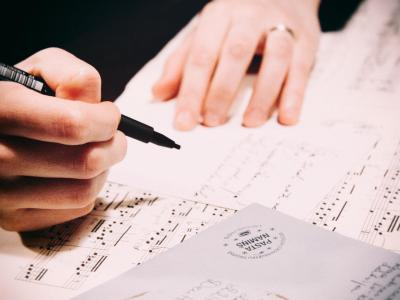Undergraduate Degree Program
Bachelor of Arts
Music Composition for Film, TV, and Games Degree
• Apply in as little as 15 minutes
Gain the practical skills to compose, arrange, and orchestrate effective dramatic music for visual media, including film, television, and interactive media. The Music Composition for Film, TV, and Games program begins with a set of core music and technology courses to provide both the conceptual foundation in music theory and the technical foundation in a digital audio workstation to record, sequence, and mix music for visuals. On your way to earning this music composition degree, you’ll work through a series of composition and orchestration courses designed to develop your ability to write (and write often!) for film, television, and interactive media. Upon graduation, you’ll have a portfolio of diverse compositions to prepare you for securing work as a film composer, music editor, film arranger, orchestrator, and more.
Upon completion of the Music Composition for Film, TV, and Games major, you will be able to:
- Analyze musical pieces on the basis of harmony, melody, counterpoint, form, rhythm, orchestration, style, genre, performance technique, and other musical qualities
- Explore the role of music in a dramatic medium
- Examine the works of master composers and innovators in music for visual media
- Explain the structure of, and practices in, film, television, and video game industries, including the different stages of development in visual media projects
- Create a production or design plan for a project that involves defining scope, milestones, and staffing structure
- Compose, arrange, and orchestrate effective dramatic music
- Record and mix scores and music stems in a digital audio workstation
- Mockup realistic-sounding orchestral demos in a digital audio workstation
- Create and edit temporary and final soundtrack recordings to picture
- Create a portfolio of compositions for visual media in various styles
- Develop a career advancement plan to attain freelance work or a staff position as a composer, orchestrator, or technical production worker in the film, television, and interactive media industries
Admission Requirement: Demonstration of Musicianship
For the Music Composition for Film, TV, and Games major, students are required to submit ONE of the following:
- A portfolio of at least two original compositions. Students should submit musical notation for each composition as PDF files. Though not required, it is also helpful to submit a sound recording (MP3 file) of each piece. Students will not be evaluated on the production quality of the recordings, but rather on the compositional ideas expressed in the recordings.
- A recorded video audition, in which the student performs a prepared piece (original or cover) in any musical style on his/her principal instrument. The performance should be an unedited take, approximately 3-5 minutes in length, in any style, which demonstrates the student's instrumental proficiency and overall musicianship.The video should be uploaded to a website like YouTube or Vimeo, with a link provided for review by the Board of Admissions.
Curriculum
(120 Credits)
-
Concentrate Courses (54 credits)
Complete the following (51 credits):
- OEART-115Basic Ear Training or OEART-119Ear Training 1
- OEART-320Harmonic Ear Training: Recognizing Chord Progressions
- OCWPR-103Music Notation and Score Preparation using Sibelius Ultimate
- OCOMP-110Music Theory and Composition 1
- OCOMP-111Music Theory and Composition 2
- OCOMP-210Music Theory and Composition 3
- OCOMP-211Music Theory and Composition 4
- OCOMP-250Counterpoint
- OCWPR-260Film Scoring 101
- OCOMP-367Contemporary Techniques in Music Composition 1
- OCWPR-365Orchestration 1
- OCOMP-485Contemporary Techniques in Music Composition 2
- OCOMP-490Music Composition for Film and TV 1
- OCOMP-492Interactive Scoring for Games
- OCOMP-491Music Composition for Film and TV 2
- OCOMP-493World Music Composition Styles
- OCOMP-495 Music Composition for Film, TV, and Games Capstone
-
Choose one keyboard course from the following (3 credits):
- OPIAN-100Berklee Keyboard Method or OPIAN-150Keyboard for the Electronic Musician or OPIAN-200Piano Technique 101 or OPIAN-210Intermediate Keyboard or OPIAN-215Keyboard Technique for Songwriters or OPIAN-220Blues and Rock Keyboard Techniques or OPIAN-230Pop/Rock Keyboard or OPIAN-240Piano Scales 101 or OPIAN-245Piano Chords 101 or OPIAN-305Piano Technique 201 or OPIAN-310Piano and Keyboard Techniques for Session Musicians or OPIAN-315Jazz Piano or OPIAN-400Advanced Jazz Piano or OPIAN-405Keyboards for Live Performance: Techniques and Technology
-
Elective Courses (24 credits)
Complete any three courses coded with OMPRD. (9 credits)
- OMPRD-110Music Video Production
- OMPRD-160Music Production Analysis
- OMPRD-162Critical Listening 1
- OMPRD-180Pro Tools 101
- OMPRD-185Live Event Sound Engineering and Concert Production 101
- OMPRD-202Sound Design for the Electronic Musician
- OMPRD-205Music Writing and Production with the iPad
- OMPRD-208Learn to DJ with Traktor
- OMPRD-210Audio Fundamentals for Recording
- OMPRD-221Pro Tools 110
- OMPRD-228Writer, Engineer, Producer in the Home Studio
- OMPRD-250Music Video Editing with Final Cut Pro
- OMPRD-251Creative Video Editing with Adobe Premiere
- OMPRD-262Advanced Audio Ear Training for Mix Engineers
- OMPRD-273Producing Music with Logic
- OMPRD-275Producing Music with Reason
- OMPRD-278Ableton Live Fundamentals
- OMPRD-279Producing Music with Cubase
- OMPRD-281Performing with Ableton Live
- OMPRD-282Ableton Live Techniques: Sampling
- OMPRD-285Live Event Sound Engineering and Concert Mixing 201
- OMPRD-287Live Sound: Mixing and Recording
- OMPRD-295Game Audio 101
- OMPRD-341Max Programming: Introduction to Procedural Music
- OMPRD-442Audio Mastering Techniques
- OMPRD-345Game Audio Production with Wwise
- OMPRD-355Microphone Techniques
- OMPRD-365Vocal Production
- OMPRD-379Ableton Live Techniques: Synthesizers and Effects
- OMPRD-380Mixing and Mastering with Pro Tools
- OMPRD-382Mixing and Mastering for the Electronic Musician
- OMPRD-383Ableton Live Techniques: Non-Linear Creative Strategies and Composition
- OMPRD-385Remixing
- OMPRD-386Programming and Producing Drum Beats
- OMPRD-389Audio Post Production for Film and TV
- OMPRD-402Creative Digital Signal Processing (DSP) for Music and Visuals
- OMPRD-320Art of Mixing
- OMPRD-425Advanced Mixing and Mastering with Pro Tools
- OMPRD-375Creative Music Production Skills
- OMPRD-480Sylvia Massy: Creative Approaches to Recording and Producing Music
-
Complete any five courses, except Liberal Arts courses coded with OLART, OLSOC, OLMSC, or OAFST in a given student's area of interest and professional development (e.g., music business, production, songwriting, arranging, orchestration, etc.). (15 credits)
-
Liberal Arts Courses (42 Credits) +
-
Complete one Composition/Writing (OLART) course from the following (3 credits):
- OLART-111 College Writing or OLART-201 Creative Writing: Literature Studies for Musicians or OLART-215 Creative Writing: Poetry or OLART-216 Creative Writing: Finding Your Voice
-
Complete one History (OLART) course from the following (3 credits):
- OLART-170 Rock History or OLART-220 History of Film Music or OLART-231 Art History of the Western European Tradition or OLART-233 Music History of the Western World 1: Medieval, Renaissance, and Baroque or OLART-234 Music History of the Western World 2: Classical, Romantic, and Modern
-
Complete any four additional Arts/Humanities (OLART, OMPRD, OCDAN, OCTHR, OAFST) courses from the following (12 credits):
- OLART-100 Developing Your Artistry
- OMPRD-110 Music Video Production
- OAFST-110 Black Creative Expression: An Introduction to Africana Studies
- OLART-111 College Writing
- OLART-160 Digital Cinematography Fundamentals
- OLART-170 Rock History
- OLART-201 Creative Writing: Literature Studies for Musicians
- OLART-205 Game Design Principles
- OLART-215 Creative Writing: Poetry
- OLART-216 Creative Writing: Finding Your Voice
- OLART-220 History of Film Music
- OLART-231 Art History of the Western European Tradition
- OLART-233 Music History of the Western World 1: Medieval, Renaissance, and Baroque
- OLART-234 Music History of the Western World 2: Classical, Romantic, and Modern
- OLART-400 Career and Job Success in the Music Industry
- OMPRD-250 Music Video Editing with Final Cut Pro
- OMPRD-251 Creative Video Editing with Adobe Premiere
- OCDAN-103 Iconic Dance and Urban Movement
- OCTHR-103 Script Analysis for Theater
-
Complete four Social Sciences (OLSOC) courses from the following (12 credits):
- OLSOC-100 Wellness for Artists: Music, Movement, and Mindfulness
- OLSOC-150 The Language of Film and TV
- OLSOC-180 Project Management for Musicians
- OLSOC-200 Business Communications
- OLSOC-210 Music, Self, and Society
- OLSOC-226 New Media Economics: Music, Mobile, Gaming, and Online Markets
- OLSOC-307 Music Cognition
-
Complete four Math and Physical/Natural Sciences (OLMSC, OMPRD, OMBUS) courses from the following (12 credits):
- OLMSC-101Music Production 101
- OLMSC-130Applied Mathematics for Musicians
- OLMSC-150Computer Programming Fundamentals
- OLMSC-200A Scientific Approach to Nutrition and Health for Performing Artists
- OLMSC-215Acoustics
- OLMSC-250Music and Neuroscience
- OLMSC-260Sampling and Audio Production
- OMPRD-210Audio Fundamentals for Recording
- OMBUS-475Music Business Finance
How should I set up my schedule, based on the above requirements?
Check out this handy planning guide to help you understand which courses you should take during which semester.
View Sample ScheduleHow to Apply
Your time is valuable, and our online application makes applying as straightforward as possible.
-
Create an account in our application portal, and complete / submit your online application. You'll need:
- A 500-750-word essay, or a 3-5-minute video essay
- Prepare a Demonstration of Musicianship
-
The email addresses / contact information of two recommenders who will provide your letters of recommendation
Start / Resume Your Application
-
Nice! After submission, be sure to order your official transcripts.
- A 500-750-word essay, or a 3-5-minute video essay
- Prepare a Demonstration of Musicianship
- The email addresses / contact information of two recommenders who will provide your letters of recommendation
Read the full details of undergraduate admission requirements here.
Save
65%
Online undergraduate degree tuition vs. campus tuition
Affordable Tuition
Online undergraduate degree tuition is $62,150 ($63,350 Sept onward) for 120 credits (includes associated fees).
Read full tuition and associated program fee details for this, and all other undergraduate programs here.
Available Financial Aid
Ready to Return to Berklee or Transfer in Credits from Another Institution to Complete Your Degree?
Students transferring in from an accredited institution can carry over up to 60 credits, and students with previous Berklee experience may be able to transfer even more.
Learn about our different transfer options:













